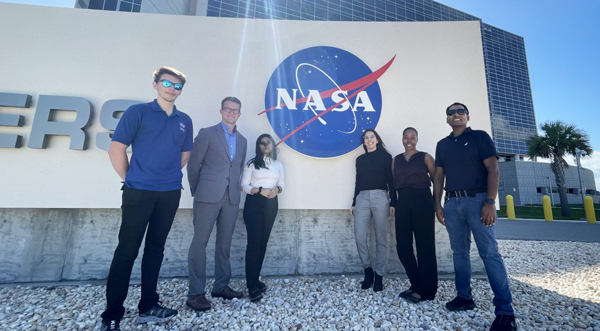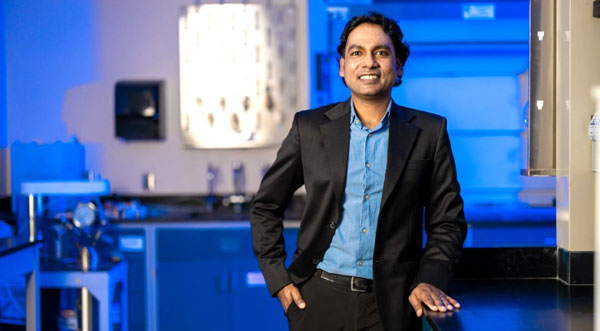The research focuses on sustainable methods for converting waste into energy

BREVARD COUNTY, FLORIDA – Toufiq Reza, an associate professor of chemical engineering at Florida Tech, has spent years researching sustainable waste conversion techniques on Earth. When Florida Tech offered him a sabbatical, he jumped at the opportunity to learn what that conversion process looks like in space, while strengthening the university’s already close ties to NASA.
In fall 2023, Reza became the first professor to use school funds to spend a semester at NASA’s Kennedy Space Center, working with Annie Meier, who leads a team developing methods to convert the trash generated by astronauts during missions into fuel, called in-situ resource utilization (ISRU).
“I wanted to do something different that I had never done before. I have done research in my field; I know who the players are,” Reza said. “I could have easily gone to a research lab at another university and continued my research there. But I wanted to learn something new.”
His sabbatical led to a new partnership between NASA Kennedy and Florida Tech.
This summer, they signed an addendum to their existing Space Act Agreement that allows the Kennedy Space Center (KSC) and the university to conduct joint research on logistical waste management and ISRU.
“At NASA, we want researchers who are doing something that could help us, that could create synergies, and who are not reinventing the wheel,” says Jose Nuñez, manager of university partnerships and small satellite capabilities at NASA Kennedy.
“The goal is to find professors who can be of use to the agency in an area where more research is needed.”
Under the agreement, KSC will share raw materials, waste simulation samples and information such as gas composition data with Florida Tech.
In return, the university will analyze and share the results, for example which useful products can be obtained from the waste from gas gasification as plant nutrients, and evaluate value-added applications.
“I will encourage students to work on some of their technologies and test them in our lab and vice versa. This is a huge thing,” Reza said. “We can learn from each other and help each other.”
Reza’s students have already visited Meier’s lab, and Meier and her KSC team came to Florida Tech to present their research and tour the university’s research facilities.
Meier’s goals are similar to Reza’s: both researchers want to find sustainable ways to convert garbage and waste into energy, materials and chemicals.

However, the methods are not fully transferable to the two different environments of Earth and space. On Earth, Reza explained, the waste could be burned or stored in a landfill. Neither of these options is feasible in space.
“You can’t dig up the lunar soil and bury it. There’s no oxygen or air to burn it… there’s no water,” Reza explained.
Currently, astronaut waste such as food packaging, clothing, toiletries and uneaten food is sent back to Earth and burned along the way. But Meier is working on advancing waste reduction technologies that Reza has seen up close. One of her projects, the Orbital Syngas/Commodity Augmentation Reactor (OSCAR), mixes oxygen, heat and trash in a reactor that burns the trash and captures the resulting gas.
Over the course of the semester, Reza assisted in the KSC Applied Chemistry lab where Meier’s research took place, offering both expertise and additional help, from measuring samples to reading literature.
He also took note of innovative technologies to develop new research ideas, such as the possibility of using the tools learned to develop a method to protect metal coatings in space.
Meier’s waste conversion technology is designed for space, but Reza said it is unlikely that their complete waste conversion systems could be deployed on Earth.
Just as water and oxygen are limited in space but plentiful on Earth, vacuum is plentiful in space but expensive to create at home. But that’s not stopping researchers from taking inspiration from the new partnership.
“We can learn from them and then integrate some of their technology into ours to make our technology more sustainable and vice versa,” Reza said. “They can improve their technology by using some of our technology as well.”
As Meier said, “I wanted to learn how we could bring some of our technologies to the terrestrial side, and he wanted to learn from us how we could move into the space sector. So it was a really great connection.”
CLICK HERE FOR BREVARD COUNTY NEWS

